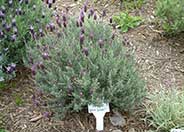
Common name:Otto Quast Spanish Lavender
Botanical name:Lavandula stoechas 'Otto Quast'
This round shrub will grow to about 3' high and has small, gray green leaves with purple flowers that bloom in summer. It is more prostrate than its parent Lavandula stoechas. The flowers resemble a purple pineapple! 'Otto Quast' is drought tolerant once it is established and cold tolerant to 5 degrees F.

Common name:Butterfly-Iris, Fortnight Lily
Botanical name:Dietes iridioides
This clumping evergreen Iris bears tall, narrow leaves to 30" tall and white flowers marked purple in the center on stalks up to 3' tall. This variety has stiffer, darker foliage than the bicolor form. It requires sun to part shade with little or no summer watering when established. -Monterey Bay Nursery
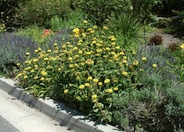
Common name:Jerusalem Sage
Botanical name:Phlomis fruticosa
This hardy perennial is a useful, old-time garden plant with coarse, woolly gray green, wrinkled leaves and yellow, 1" flowers in ball-shaped whorls. It handles drought and poor soils but needs full sun.
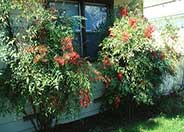
Common name:Nandina, Heavenly Bamboo
Botanical name:Nandina domestica
Nandina domestica is a graceful upright shrub that grows from 3'-6' in height. It gets its name from its bamboo-like growth habit. When thinned from the center it bears a remarkable resemblance to bamboo. It is best used in groups. It can be used in a shaded patio or out in a shrub border with full sun. An interesting feature of Heavenly Bamboo is the bronze color in the new growth when planted in full sun. It also bears clusters of white flowers in the spring.
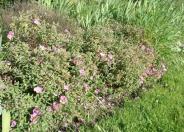
Common name:Furry-Leaf Rockrose
Botanical name:Cistus crispus
The crispus exhibits vigorous, upright growth to 3' tall and 5' wide with pink flowers. It requires average to good drainage, and little or no summer watering when established. The plant should be grown in sun or part shade.
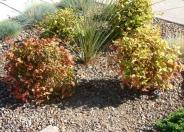
Common name:Heavenly Bamboo Dwarf Compact
Botanical name:Nandina domestica 'Compacta Nana'
The Nadina domestica ' Nana Compacta' is a small, rounded shrub that grows from 12"-15" high. Its growth habit is dense, and the leaves become bright red in color in cold, winter areas.
It can receive sun to part shade, and is used well as an accent plant.
Designer:
Photographer: Vicki Anderson
Physical weed control, including mulching, or hand removal protects the watershed from harmful chemicals.
Group plants in your garden according to their water needs (hydrozone).
Drip and other smart irrigation delivers water directly to roots, allowing no excess water for weeds.